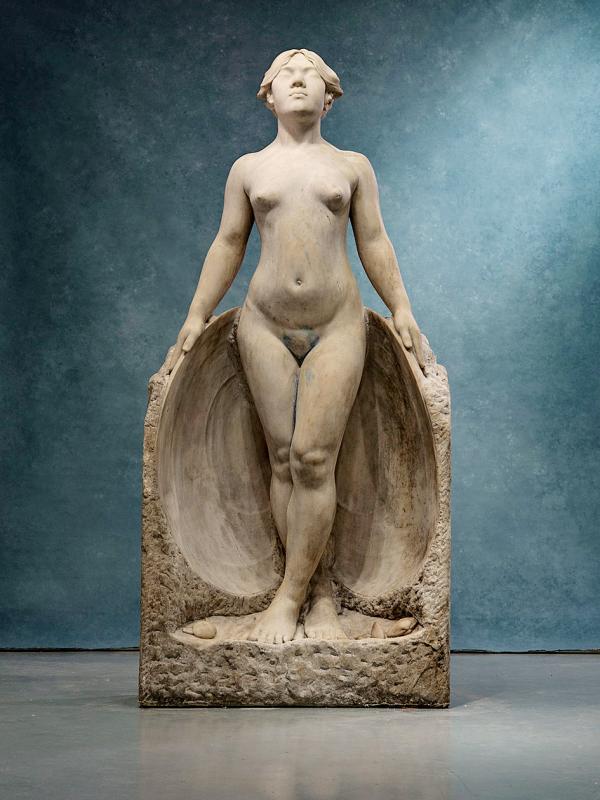A sculpture by Huang Tu-shui (黃土水) that was lost for more than half a century is to go on display this year, the Museum of National Taipei University of Education and the Ministry of Culture said on Thursday.
Huang, who lived from 1895 to 1930, in 1921 carved Sweet Dew (甘露水) from marble. It was the second work by Huang to be displayed at the Imperial Art Exhibition in Japan, the most prestigious art event in the country, where it received critical acclaim.
The sculpture was rediscovered earlier this year, 50 years after it was lost, by a team led by Lin Mun-lee (林曼麗), a professor at the university.

Photo courtesy of Huang Pang-chuan and Chunni Lin via CNA
Lin searched for the work for 20 years.
It was donated to the ministry last month, exactly a century after it was completed, and is to be included in an exhibition at the museum in Daan District (大安) opening in December.
The 1.75m sculpture was put on display in 1931, a year after Huang died of peritonitis, by the Taiwan Education Association at what is now the National 228 Memorial Museum in Taipei’s Zhongzheng District (中正).
However, the piece was abandoned at the Taichung Railway Station for unknown reasons after being transferred to the then-Provisional Taiwan Provincial Council in 1958.
The work was kept by a local family surnamed Chang (張) in their clinic until 1974, when it was moved to a factory in Taichung’s Wufeng District (霧峰), where it remained until being discovered by Lin.
Sweet Dew, which some call “Taiwan’s Venus,” is the earliest known nude statue in Taiwanese art history. It portrays a young woman with a calm yet confident countenance standing with her head tilted slightly backward and her hands holding a large shell behind her.
“It radiates an uplifting spirit, as well as being imbued with the artist’s imagination and anticipation for societal progress in Taiwan, marking a new chapter in Taiwanese art history,” the ministry wrote on Facebook.
“It is an explosive discovery,” Lin Chen-ching (林振莖), an assistant research fellow at the National Taiwan Museum of Fine Arts, was quoted by Chinese-language media as saying on Friday upon seeing photographs of the statue.
Although modeled after Sandro Botticelli’s painting The Birth of Venus, Sweet Dew reinterprets a goddess with the form of a Taiwanese female, ushering in a new art landscape for a new generation, as well as stunning the world with its beauty, he said.
Born at the beginning of Japan’s colonial rule over Taiwan, Huang was an iconic sculptor and the first Taiwanese artist to have works displayed at the Imperial Art Exhibition.
His representative works, which blended modern Western style with traditional Chinese elements, include The Chubby Playing Boy (山童吹笛), his first work to be shown at the Imperial Art Exhibition, and The Water Buffalo (水牛群像), which is on display at the Zhongshan Hall in Taipei.

POSITIVE DEVELOPMENT: Japan and the US are expected to hold in-depth discussions on Taiwan-related issues during the meeting next month, Japanese sources said The holding of a Japan-US leaders’ meeting ahead of US President Donald Trump’s visit to China is positive news for Taiwan, former Japan-Taiwan Exchange Association representative Hiroyasu Izumi said yesterday. After the Liberal Democratic Party’s landslide victory in Japan’s House of Representatives election, Japanese Prime Minister Sanae Takaichi is scheduled to visit the US next month, where she is to meet with Trump ahead of the US president’s planned visit to China from March 31 to April 2 for a meeting with Chinese President Xi Jinping (習近平). Japan and the US are expected to hold in-depth discussions on Taiwan-related issues during the

‘LIKE-MINDED PARTNER’: Tako van Popta said it would be inappropriate to delay signing the deal with Taiwan because of China, adding he would promote the issue Canadian senators have stressed Taiwan’s importance for international trade and expressed enthusiasm for ensuring the Taiwan-Canada trade cooperation framework agreement is implemented this year. Representative to Canada Harry Tseng (曾厚仁) in an interview with the Central News Agency (CNA) said he was increasingly uneasy about Ottawa’s delays in signing the agreement, especially as Ottawa has warmed toward Beijing. There are “no negotiations left. Not only [is it] initialed, we have three versions of the text ready: English, French and Mandarin,” Tseng said. “That tells you how close we are to the final signature.” Tseng said that he hoped Canadian Prime Minister Mark Carney

President William Lai (賴清德) yesterday bestowed one of Taiwan’s highest honors on Saint Vincent and the Grenadines (SVG) Ambassador Andrea Clare Bowman in recognition of her contributions to bilateral ties. “By conferring the Order of Brilliant Star with Grand Cordon on Ambassador Bowman today, I want to sincerely thank her, on behalf of the Taiwanese people, for her outstanding contribution to deepening diplomatic ties between Taiwan and SVG,” Lai said at a ceremony held at the Presidential Office in Taipei. He noted that Bowman became SVG’s first ambassador to Taiwan in 2019 and

A man walks past elementary school artworks at the Taipei Lantern Festival in Ximen District yesterday, the first day of the event. The festival is to run from 5pm to 10pm through March 15.